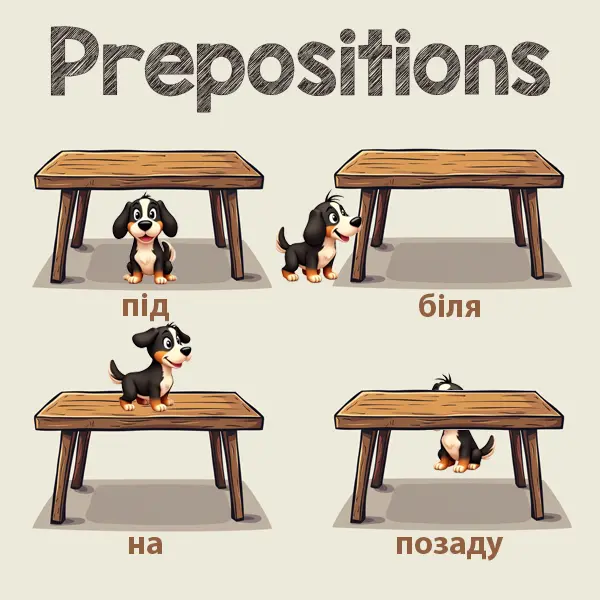
Ukrainian conjunctions
Conjunctions are an essential part of Ukrainian grammar, serving to connect words, phrases, and clauses to create more complex and meaningful sentences. They are words that join two or more elements in a sentence, and can be used to express a range of relationships, including addition, contrast, cause and effect, and more. Ukrainian …

Prepositions (прийме́нники) are an essential part of the language and are used to connect different parts of a sentence together. They are typically short words that indicate the relationship between two or more elements in a sentence, and can be used to indicate time, location, direction, manner, and other relationships. The meaning of …

Verb Mood
Ukrainian verbs have three moods: indicative (ді́йсний), conditional (умо́вний) and imperative (наказо́вий). Indicative mood expresses factual statements, opinions or questions; Conditional mood expresses desired actions or hypothetical situations. The conditional mood is formed by the past tense of the verb with the particle б (би), …

Verb Voice: active / passive
Ukrainian has two voices: active and passive. The separate group includes reflexive verbs with the postfix -ся (e.g. вмиватися to wash oneself, одягається to dress oneself). The passive voice can also be formed by the passive participle and non-personal form of participle ending in -но, -то (e.g. маши́ну поми́то the car is washed, місто …

Verb Transitivity
Verbs can be transitive (перехідні́) or intransitive (неперехідні́), depending on whether or not they require an object to express a complete thought. Most verbs are transitive. They direct their action towards the object. Examples with transitive verbs: Я чита́ю кни́гу. I read a book.Я відкрива́ю раху́нок. I open an account.Я вивча́ю …

The future tense describes actions which will happen in the future. Both imperfective and perfective Ukrainian verbs can form the future tense. Imperfective future tense There are two ways for creating the Imperfective future tense: with the help of an auxiliary verb бути (to be) and the imperfective infinitive that agrees with the …

Verb Aspect
Verb aspect expresses how an action extends over time. English has four verb aspects: simple, progressive, perfect and perfect progressive, but Ukrainian doesnt have these. We have two other aspects: imperfective and perfective. The imperfective describes the process (an uncompleted action) focusing on action, while the perfective shows …

Past tense is used to describe actions that occurred in the past. Ukrainian verbs agree in gender and number with the subject of the sentence. The past tense is formed with the suffix -в for masculine singular and -л- for feminine, neuter and plural. роби́ти(to do) говори́ти(to speak) писа́ти(to write) шука́ти(to search) ми́тися*(to wash …

Degrees of Comparison of Adverbs
The Ukrainian language, like many other languages, has degrees of comparison for adverbs. These degrees of comparison allow speakers to express differences in intensity or degree between adverbs. Adverbs of quality which end in -о or -e (derived from adjectives of quality) can have comparative and superlative degrees of comparison. There …

Adverbs
The adverbs describe how, where, or when an action took place. They are derived from adjectives, nouns, verbs, pronouns, numerals or other adverbs. The good news is that adverbs do not have gender, case, or number. Most of the adverbs are adverbs of quality and manner which are derived from adjectives and are formed by replacing the …
